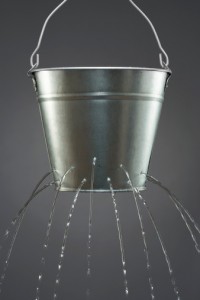Marketing is about winning new clients and keeping old ones: from the first we achieve growth and from the second stability. The business trinity of marketing, sales and customer service is oriented to accomplishing exactly those objectives. Smart marketing, relationship sales and good customer service should combine to ensure continual growth.
If only it was that easy.
 Unfortunately, we have a hole in our bucket. It may be true it costs five times more to win a new customer than to keep an old one, but somehow or another, despite our best attempts, we lose customers. Some, of course, we lose to the inevitabilities of life and circumstance, but others we lose to something far more insidious: silence.
Unfortunately, we have a hole in our bucket. It may be true it costs five times more to win a new customer than to keep an old one, but somehow or another, despite our best attempts, we lose customers. Some, of course, we lose to the inevitabilities of life and circumstance, but others we lose to something far more insidious: silence.
No news is not always good news. In fact, it seldom is. Since clients pay the bills, it is worthwhile to demand a high standard of customer service of yourself, your staff and procedures.
Most of our clients won’t complain when they encounter a problem, and, if they do, may complain to someone other than you. Some studies indicate fewer than 25% of customers even bother to complain when they are unhappy. That means there is a real possibility you will never even know you have an unhappy client. Often, therefore, it is not even enough to simply ask for feedback.
Note, too, some people you simply cannot make happy. I am not referring to the problem clients, the chronic malcontents for whom nothing is ever right, the ones who complain because it is what they do best. I’m talking about the client with which you can build a true and lasting relationship if the prime ingredients for trust are present in your customer service efforts.
We too often treat customer service as a way of fixing problems, but reactive problem solving is a rather narrow way to implement a customer service policy. To pull from clients their fullest perception of your brand, you have to be willing to fully engage the client at every point of contact.
Begin working on your customer service program. As you do, sit down with your staff and talk about customer service. If you are other than a one person shop, chances are very good your staff knows better than you how happy clients are.
Good customer service is demanding. It may be hard to hear criticism, but it’s what you don’t hear that can do your travel practice the most harm.